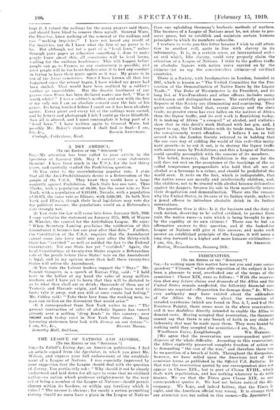A DRY AMERICA.
(To THE EDITOR. or THE " SPECTATOR."1 Fin,—By attention has been called to your article in the Spectator of January 25th. May I correct some statements therein? I have lived much in the U.S.A. for the lost thirty years, and carefully. studied the Prohibition question.
(I) You refer to the overwhelming popular vote. I state Met all the Anti-Prohibitionists desire is a Referendum of the people of the U.F.A. They know they would have a large majority ogaiust Prohibition. Hack Slate has one vote. Thus Alaska, with a population of 64,356, has the some vote as New York, with a population of 9,113,619; Nevada, with a population cf S1,875, the same vale as Illinois, with 5,638,591. In both New York and Illinois, though their local legislators may vote dry for political reasons, the populations would ou a Referendum site strongly wet.
;2) You stole the law will come into force January 26th, 1920. I copy verbatim the statement on January 17th, 1819, of Wayne It. Wheeler, the counsel for the Anti-Saloon League. He says: "When Secretary Lansing proclaims the ratification of this Amendment it -becomes law one year after that date." Further, lite Constitution of the U.S.A. requires that the Amendment cannot come into farce until one year after the thirty-sixth State has "certified " as well as ratified the fact to the Federal Government. Not ono State has yet "certified." Again, the local Constitutions of twenty-two States require a Referendum sate of the people before these States' vote on the Amendment is legal, and in my opinion mere than half these twenty-two States will refuse the Amendment.
3) Yon state the Labour leaders support the "Drys." Mr. Samuel (tempers; in a speech at Kansas City, said: "I hold here in the hollow of my -hand the voles of many million workers, and I have yet to learn that they will be dictated to as to what they shall eat or drink; thousands of them are of Teutonic and Slavonic origin, and have always been used to beer; take it away, and you will at once create bad feeling." ('obley PEW "Take their beer from the working men, no man can reckon on the discontent that would arise."
SD A correspondent from New York writes to me: "The present contraction of sales of alcoholic liquors has eaused already over a million 'drug fiends' in this country; over 100,000 such to-dny exist in New York State alone. Many far-seeing statesmen here look with dismay on our totem"—


































 Previous page
Previous page